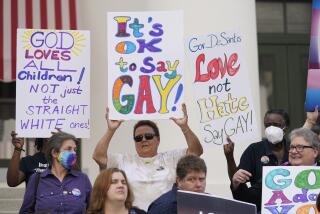Soviet Diversity of Views Is the Widest, Debate Is the Most Momentous Anywhere
- Share via
Westerners who have dismissed glasnost on the ground that it is all very well up to a point but that it does not permit discussion of this or that taboo subject, are constantly having to revise their list of untouchable topics.
At one time the idea that the Soviet Union had “solved” its nationality problem was treated as an unquestionable truth. Since 1987, if not earlier, that myth has been exposed by Soviet analysts from Mikhail S. Gorbachev on down. Until more recently it was held that although mistakes in the country’s domestic policy had indeed been made, somehow or other Soviet foreign policy (even under Josef Stalin) had been quite immune from them. Implicit criticism of such a view has been apparent to careful readers of Soviet publications for quite some time, but esoteric critiques finally gave way last month to open rejection of the idea that it was the rest of the world that was invariably out of step while the Soviet Union marched to the drumbeat of historical inevitability.
The Soviet author who broke that particular taboo was assigning fault for the failure of the Western powers to join forces in an anti-fascist alliance with the Soviet Union before the outbreak of World War II. He put much of the blame on Stalin’s decapitation of the Red Army (which at the time reduced the Soviet Union’s military credibility) and on the fact that the country was being led by someone who showed no regard for morality and had “committed unprecedented repressions using cruel and criminal methods for the sake of establishing his authoritarian power.”
We take it almost for granted that Stalin can be attacked again in the Soviet Union (although anything beyond the most pussyfooting criticism of him was taboo for the 20 years after the ouster of Nikita S. Khrushchev) and that the system he created can be described as authoritarian. Such views are to be found now practically any day of the week in Soviet newspapers or journals. What is also interesting is that qualified defenses of Stalin are also published--a greater diversity of view in print than was to be found when Khrushchev was leading his anti-Stalinist campaign.
Most important and encouraging of all, however, is the extent to which Soviet criticism of Stalin has moved beyond Khrushchev’s inclination to place almost the entire burden of culpability on the supreme leader and a few of his close associates. What is now being questioned by many serious reformers in the Soviet Union is the political system that allowed Stalin to get away with his arbitrariness and mass terror and that, in many of its institutional structures (albeit not in the way they function), remains in place to this day.
Tatyana Zaslavskaya, director of the newly created Center for the Study of Public Opinion in the U.S.S.R., is a spirited reformer and social scientist who has Gorbachev’s ear. Earlier this month she was quoted in Isvestia as saying that “a powerful ruling nucleus subordinate to no one has always” been a characteristic of the Soviet system. That may not be news to Western observers of the Soviet scene, but it is the kind of statement that even in Leonid I. Brezhnev’s time, if committed to typescript, would have been more likely to earn its author a lengthy term in a labor camp than publication in a mass-circulation newspaper.
Not only the way in which delegates for the forthcoming party conference are being chosen but also the role of vested interests in the choice of the Soviet top leader have come under fire. Revolts from below (sometimes with a bit of help from the top) have forced back onto the list of conference delegates at least some of the most radical reformers who were selected by their primary (workplace) party organization and then were eliminated by the party bureaucrats at the district level. The result is that the delegates to the party conference in Moscow at the end of the month will include fewer committed supporters of reform than Gorbachev would like to have there. Yet there will be a sprinkling of people more outspoken and radical than could have found their way into such an all-union party conference or party congress over the past half-century and longer.
Perhaps we are just beginning in the West to wake up to the fact that the debate now taking place in the Soviet Union is the most momentous to be occurring anywhere in the world in 1988. The gap that separates the two American presidential contenders is by no means as wide as that which divides the more radical Soviet communist reformers from their conservative communist opponents.
In terms of its break with the past, what is happening in the Soviet Union under the conditions of perestroika and glasnost is incomparably more dramatic than our routine election debates in the West. For approximately 65 years there has been nothing like the open political argument in the Soviet Union that is taking place there now. The most serious item of all on the agenda of Soviet reformers is that, this time around, rights of dissent and debate should become institutionalized. That they should succeed, so that the outcome this time is very different from the last, is in the interest of us all.
More to Read
Sign up for Essential California
The most important California stories and recommendations in your inbox every morning.
You may occasionally receive promotional content from the Los Angeles Times.












